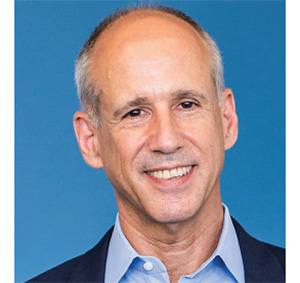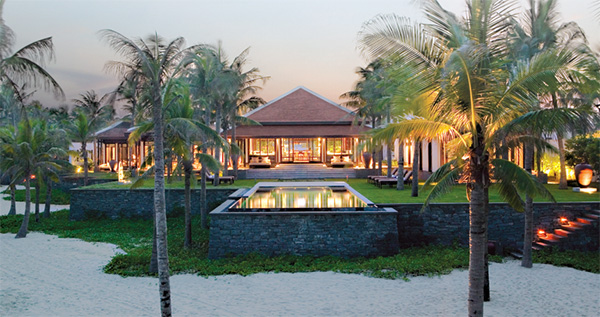Indochina Capital breaks new ground
 |
Staring out through the wide glass windows of the Indochina Capital office at Indochina Plaza Hanoi, Peter Ryder listed off the series of landmark Indochina Capital projects that he and his team have developed and operated that have cemented the company’s standing as the leading luxury property developer in Vietnam: The Nam Hai, Six Senses Con Dao, Hyatt Regency Danang, Montgomerie Links Vietnam, Indochina Plaza Hanoi. They have not only established Indochina Capital’s well deserved reputation but have also transformed Vietnamese buyers’, tenants’ and tourists’ perception of luxury.
Among the first American businessmen to come to Vietnam post-war, Peter is widely recognised as one of the most prolific foreign investors in Vietnam.
Peter had already been living and working in Vietnam for several years (since 1992) before relationships were normalised between the United States and Vietnam in 1995. He has long been a firm believer in the country’s great potential and has always emphasised the importance of US-Vietnam bilateral relations for the economy as a whole to flourish and businesses to grow in Vietnam, especially for American companies.
“When I first came to Vietnam I really had no idea what to expect. The only images I had in my mind were of the war. As such, I was initially surprised and ultimately totally and positively overwhelmed by what I saw and experienced,” said Peter.
He recounts encountering everything from French colonial architecture in Hanoi and Ho Chi Minh City, incredibly long stretches of pristine beaches along the Central Coast, the friendly, gracious and graceful people, and the wonderful scents and tastes of local cuisine, all wrapped up in a layer of timeless traditional culture. As an American investor, Peter saw the potential that Vietnam held from day one.
Peter’s first major investment was the development in the 1990s of 63 Ly Thai To, the landmark office building adjacent to Hanoi’s Opera House, which continues to be recognised as one of the best conceived and designed buildings in the capital city. There he partnered with the Vietnam Fatherland Front and Hongkong Land.
 |
Global interest in Vietnam grew as the 1990s progressed, due in large part to the lifting of the US trade embargo in 1994, followed by the normalisation of US-Vietnam diplomatic relations in 1995. This paved the way for the 2001 signing of the US-Vietnam bilateral trade agreement, accompanied by various other bilateral and multilateral political, financial, and trade arrangements.
Vietnam’s accession to the WTO in 2007 unleashed another wave of foreign investment several years later which continues through to today.
In 1998, more attracted than ever by Vietnam’s combination of geography, demographics, natural resources, political stability, and a large, well-educated, hardworking population with tremendous entrepreneurial energy, Peter Ryder founded Indochina Capital with his long-time friend and partner, Rick Mayo-Smith. Indochina Capital thus became the corporate vehicle through which Peter has spearheaded various investment programmes in Vietnam for nearly 20 years now.
Indochina Capital will always be known as a foreign investor that has led the way in transforming Vietnam’s Central Coast into a world-class tourist destination with a series of one-of-a-kind leisure properties.
Beginning in the mid-1990s with the development of the Furama Resort led by Rick Mayo-Smith and Indochina Capital’s chairman, Dr Marc Faber, and followed by the 2007 opening of The Nam Hai – a super luxury all villa resort near Hoi An, which Travel+Leisure named the Best Resort in the World at their 2008 design awards ceremony, Indochina Capital began the process of putting Danang-Hoi An on the map as the next great Southeast Asian resort destination on par with Bali and Phuket. The Nam Hai has continued to garner international acclaim as one of the world’s most renowned luxury resorts, and today far outperforms its Vietnam peers. At The Nam Hai, Indochina Capital pioneered the introduction of branded residences in Vietnam, a real estate investment product type that they again implemented at Six Senses Con Dao and Hyatt Regency Danang, thus cementing the company’s reputation as the most innovative developer in Vietnam.
Looking back over the last 20-plus years, Peter points to the positive impact that the evolving US-Vietnam relationship has contributed to the investment environment, noting that without the building of mutual trust between the two nations, Indochina Capital would never have been able to accomplish what it has to date. He pointed to President Clinton’s historic trip to Vietnam in 2000 and noted that US President Barrack Obama’s upcoming state visit to Vietnam following his meeting with Party Secretary Nguyen Phu Trong in Washington, DC at the White House in 2015 will take the US-Vietnam relationship to the next level, further enabling bilateral cross-border investment and trade.
Having established itself as the leading luxury leisure and residential developer in Vietnam,
Indochina Capital is now breaking new ground in the real estate arena with the creation of two new property development platforms: ICC-Kajima Development Company and Indochina Vanguard Hotels.
ICC-Kajima: Indochina Capital is entering into a joint venture with Kajima Corporation, a leading Japanese contractor and real estate developer to develop and asset manage properties in Vietnam. ICC-Kajima will initially focus on residential and hospitality projects in Hanoi and Ho Chi Minh City.
Indochina Vanguard: Indochina Capital has created a joint venture with Vanguard Hotels, a Southeast Asian-focused no frills affordable luxury hotel developer and operator now rolling out properties in Malaysia and the Philippines, to launch a similar, Vietnam-branded product.
Indochina Vanguard will initially focus on the major urban areas of Hanoi, Ho Chi Minh City, and Danang, and will ultimately expand into a number of Vietnam’s secondary markets.
“We are very excited about utilising the Indochina Capital foundation – our projects, our team – to build both new platforms into major ongoing businesses to take advantage of the opportunities that Vietnam presents as it continues to march into the future”, Peter Ryder said.
What the stars mean:
★ Poor ★ ★ Promising ★★★ Good ★★★★ Very good ★★★★★ Exceptional
Latest News
More News
- The generics industry: unlocking new growth drivers (February 04, 2026 | 17:39)
- Vietnam ready to increase purchases of US goods (February 04, 2026 | 15:55)
- Steel industry faces challenges in 2026 (February 03, 2026 | 17:20)
- State corporations poised to drive 2026 growth (February 03, 2026 | 13:58)
- Why high-tech talent will define Vietnam’s growth (February 02, 2026 | 10:47)
- FMCG resilience amid varying storms (February 02, 2026 | 10:00)
- Customs reforms strengthen business confidence, support trade growth (February 01, 2026 | 08:20)
- Vietnam and US to launch sixth trade negotiation round (January 30, 2026 | 15:19)
- Digital publishing emerges as key growth driver in Vietnam (January 30, 2026 | 10:59)
- EVN signs key contract for Tri An hydropower expansion (January 30, 2026 | 10:57)
















 Mobile Version
Mobile Version